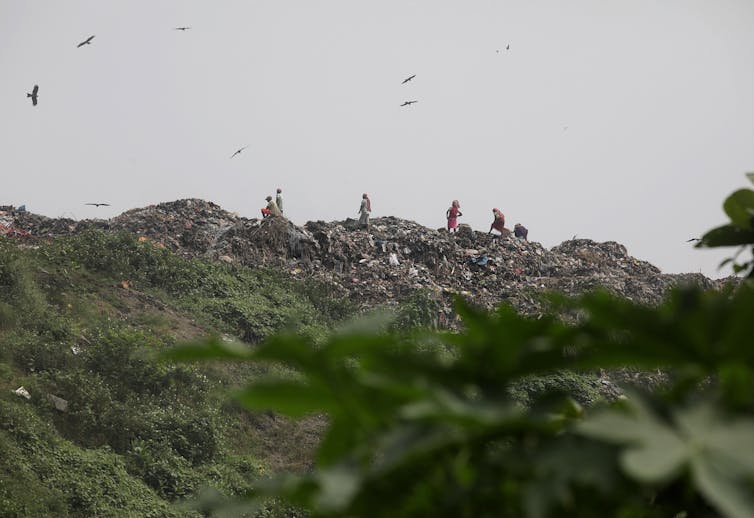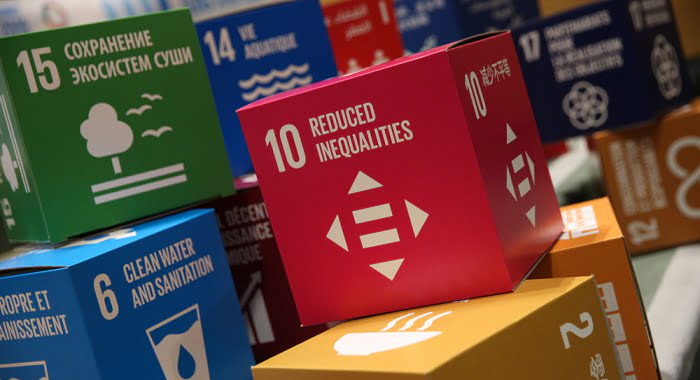It's almost seven years since the UN created it's SDGs, what impact have they had during that time, asks Frank Biermann, Professor of Global Sustainability Governance at Utrecht University.
In September 2015, leaders from 193 countries gathered in the UN assembly hall in New York to plan nothing less than “transforming our world”. This was the birth of the sustainable development goals, which aimed to “free the human race from the tyranny of poverty and want and to heal and secure our planet”.
There are 17 sustainable development goals, or SDGs, encompassing 169 more detailed targets and over 200 measures of progress. There is almost nothing that the UN does not seek to improve with these goals, from reducing poverty and hunger to securing better health, education, gender equality, sanitation, energy, economic growth and infrastructure, while reducing social inequality, ensuring sustainable consumption, protecting the climate, ocean, biodiversity and forests, and furthering peace and justice.
To give just a few examples of the 169 targets under these overarching goals, governments agreed, by 2030, to halve the proportion of people in poverty, end hunger, ensure all children complete a quality education for free, raise the income of the poorest 40% of each country’s population at a rate above the national average, and significantly increase funding to conserve and sustainably use biodiversity and ecosystems. The list goes on.
Sustainable development goals are found wherever UN bureaucrats and international diplomats meet. You’ll see the 17 flags of the SDGs in the lush gardens of the UN headquarters in New York. Posters listing the SDGs hang in government offices all around the world. Dozens of international meetings are held to discuss them each year. The UN even announced an international decade of action for achieving the goals. In the Netherlands, where I live, the government has appointed an SDG coordinator whom I once spotted in an electric car painted with the SDG symbols and a suit with the SDGs printed on the inner lining. In short, if you turn over a stone, you may find an SDG.
And yet, it is fair to ask: do these global goals actually change anything? Do they tangibly influence the actions of governments, business leaders, mayors, UN bureaucrats and university presidents? For the last few years, a growing community of social scientists has considered this question. With 61 colleagues from around the world, we analysed more than 3,000 academic studies that scrutinised aspects of the SDGs. Our findings are published in the journal Nature Sustainability, and a more detailed assessment will soon be published as a book. Because we believe it is important to share what we found with everyone, both publications will be free to download and read.
All talk, no action
Unfortunately, our findings are disheartening. The SDGs have infiltrated the things people say, think and write about global sustainability challenges. Governments mention the SDGs in their national reports to the UN, and some have set up coordinating units to implement them. Multinational corporations like to refer to the SDGs as well – especially those goals that are least disruptive to their commercial activities, like SDG 8 which calls on governments to “sustain per capita economic growth in accordance with national circumstances”. And unsurprisingly, UN organisations are all formally supportive of the SDGs.

But nothing has changed where it matters. We found few new policies, institutions or budget allocations designed to further specific goals. Did any government change its laws to achieve the many intersecting transformations envisioned by the SDGs? Did any ministry in those governments create new programmes for implementing the SDGs? If so, there is little evidence of it. What we found instead are changes in discourse. Those in power now refer to the SDGs often. Yet the way they govern has not changed.
What should we make of this? Optimists point to the SDG timeline: the SDGs were only agreed upon in 2015 and are to be achieved by 2030. The analysis that we published largely uses research from before 2021. In other words, we have eight more years to go. That governments and corporations talk differently about sustainability and refer to the SDGs more often today can be seen as a sign of hope that this talk will be followed by action.
And yet, mere talk can backfire by conferring legitimacy on unsustainable behaviour, letting corporate leaders wave colourful SDG flags while prizing profits above all else. Simply talking about SDGs can demobilise civil society by creating a false impression of action. Even as promised, transformations remain elusive. Idle talk acts as a smokescreen, hiding the reality of delay and stagnation.
I do not want to belittle the importance of having the SDGs. Our study only provides a snapshot of the present state of implementing them. The SDGs do reflect some wonderfully high-minded global ambitions, not least by focusing on global inequalities (SDG 10), necessary improvements to national and global institutions (SDG 16) and the reduction of harmful consumption patterns in wealthy countries (SDG 12).
But we have to make the goals actually work. Civil society and social movements need to prick the bubble of SDG talk. Government leaders and industry bosses must not be allowed to hide behind SDG flags in their offices, SDG buttons on their lapels and SDG logos on their glossy pamphlets. The SDGs cannot remain a lofty inspiration. We must convert their promise to action.
This article is republished from The Conversation under a Creative Commons license. Read the original article.
